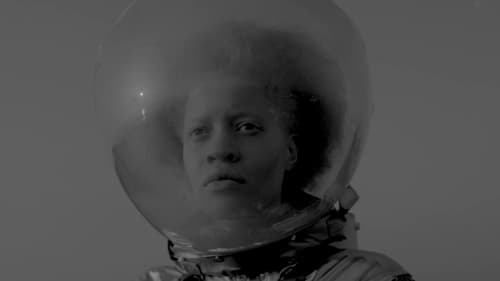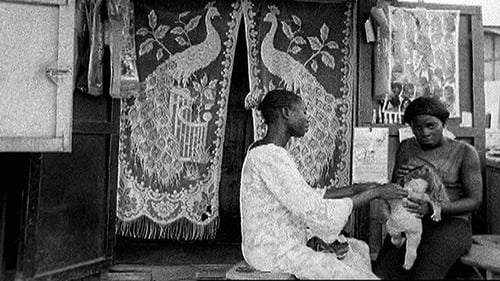
Akosua Adoma Owusu
Birth : 1984-01-01, Alexandria, Virginia, USA
History
Akosua Adoma Owusu (b. 1984) is a Ghanaian-American filmmaker, producer, and cinematographer whose films address the collision of identities. Interpreting the notion of "double consciousness," coined by sociologist and civil rights activist W. E. B. Du Bois to define the experience of black Americans negotiating selfhood in the face of discrimination and cultural dislocation, Owusu aims to create a third cinematic space or consciousness. In her works, feminism, queerness, and African identities interact in African, white American, and black American cultural environments.
Named by Indiewire as one of 6 pre-eminent Avant-Garde Female Filmmakers Who Redefined Cinema, she was a featured artist of the 56th Robert Flaherty Film Seminar programmed by renowned critic and film curator Dennis Lim. Owusu has exhibited worldwide including at the Berlinale, Rotterdam, Locarno, Toronto, New Directors/New Films (New York), and the BFI London Film Festival. She has won numerous fellowships and grants including from the Guggenheim Foundation, Westridge Foundation, Knight Foundation, Creative Capital, MacDowell Colony, Camargo Foundation and most recently from the Residency Program of the Goethe-Institut Salvador-Bahia. Currently, she divides her time between Ghana and New York, where she works as an Assistant Professor at the Pratt Institute in Brooklyn.
Akosua Adoma Owusu is represented by Andrew Farber at Farber Law LLC.

Director
A companion piece to Pelourinho: They Don’t Really Care About Us (NYFF57), King of Sanwi continues Akosua Adoma Owusu’s exploration of Michael Jackson as a global pop icon. Here, Michael’s long affinity with the African continent—from the Jackson 5’s arrival in Senegal in 1974 to Michael’s coronation as an Ivorian king in 1992—is captured in vibrant, fuzzy archival video, made visceral by Owusu’s funky audiovisual collage and richly material direct animation effects.

Director of Photography
White Afro employs an archival instructional video on how to offer curly perms or body waving services to their white clientele, ostensibly for financial gain.

Producer
White Afro employs an archival instructional video on how to offer curly perms or body waving services to their white clientele, ostensibly for financial gain.

Director
White Afro employs an archival instructional video on how to offer curly perms or body waving services to their white clientele, ostensibly for financial gain.

Director of Photography
The starting point for this colourful film is a letter from human rights activist W.E.B. Du Bois to the American embassy in Brazil. The fact that in 1927 it was impossible for African Americans to travel to Brazil reminds us of the inequality still faced by that country’s black inhabitants.

Director
The starting point for this colourful film is a letter from human rights activist W.E.B. Du Bois to the American embassy in Brazil. The fact that in 1927 it was impossible for African Americans to travel to Brazil reminds us of the inequality still faced by that country’s black inhabitants.

Screenplay
This film follows Kamara, a Nigerian woman, on her journey to self-realization. When Tracy, an artist, finally emerges from her studio one afternoon, Kamara, her son's nanny, is inspired to become Tracy's muse

Director
This film follows Kamara, a Nigerian woman, on her journey to self-realization. When Tracy, an artist, finally emerges from her studio one afternoon, Kamara, her son's nanny, is inspired to become Tracy's muse

Producer
Mahogany Too takes the 1975 cult classic Mahogany – a fashion-infused romantic drama – as its base. The film examines and revives Diana Ross's iconic portrayal of Tracy Chambers. Analogue film provides vintage tones, which emphasises the essence of the character, re-creating Tracy’s qualities through fashion, modelling, and styling.

Director
Mahogany Too takes the 1975 cult classic Mahogany – a fashion-infused romantic drama – as its base. The film examines and revives Diana Ross's iconic portrayal of Tracy Chambers. Analogue film provides vintage tones, which emphasises the essence of the character, re-creating Tracy’s qualities through fashion, modelling, and styling.

Editor
This epistolary short film invites us into the unsettling life of a young Ghanaian man struggling to reconcile his love for his mother with his love for same-sex desire. Berlin International Film Festival 2016: Nominated Golden Berlin Bear for Best Short Film and Teddy Best Short Film.

Cinematography
This epistolary short film invites us into the unsettling life of a young Ghanaian man struggling to reconcile his love for his mother with his love for same-sex desire. Berlin International Film Festival 2016: Nominated Golden Berlin Bear for Best Short Film and Teddy Best Short Film.

Producer
This epistolary short film invites us into the unsettling life of a young Ghanaian man struggling to reconcile his love for his mother with his love for same-sex desire. Berlin International Film Festival 2016: Nominated Golden Berlin Bear for Best Short Film and Teddy Best Short Film.

Director
This epistolary short film invites us into the unsettling life of a young Ghanaian man struggling to reconcile his love for his mother with his love for same-sex desire. Berlin International Film Festival 2016: Nominated Golden Berlin Bear for Best Short Film and Teddy Best Short Film.

Cinematography
Bus Nut rearticulates the 1955 Montgomery Bus Boycott, a political and social protest against U.S. racial segregation on the public transit system of Montgomery, Alabama, and its relationship to an educational video on school-bus safety. Actress MaameYaa Boafo restages a vintage video while reciting press-conference audio of Rosa Parks on a re-created set in New York City.

Producer
Bus Nut rearticulates the 1955 Montgomery Bus Boycott, a political and social protest against U.S. racial segregation on the public transit system of Montgomery, Alabama, and its relationship to an educational video on school-bus safety. Actress MaameYaa Boafo restages a vintage video while reciting press-conference audio of Rosa Parks on a re-created set in New York City.

Director
Bus Nut rearticulates the 1955 Montgomery Bus Boycott, a political and social protest against U.S. racial segregation on the public transit system of Montgomery, Alabama, and its relationship to an educational video on school-bus safety. Actress MaameYaa Boafo restages a vintage video while reciting press-conference audio of Rosa Parks on a re-created set in New York City.

Executive Producer
16th July 1969: America prepares to launch Apollo 11. Thousands of kilometers away, a ragtag group of Zambian exiles is trying to beat America to the Moon.

Writer
This short by Akosua Adoma Owusu offers a spellbinding, semi-autobiographical interpretation of a traditional Ghanaian folktale in which the contemporary collides with the mythological in both content and form.

Producer
This short by Akosua Adoma Owusu offers a spellbinding, semi-autobiographical interpretation of a traditional Ghanaian folktale in which the contemporary collides with the mythological in both content and form.

Director
This short by Akosua Adoma Owusu offers a spellbinding, semi-autobiographical interpretation of a traditional Ghanaian folktale in which the contemporary collides with the mythological in both content and form.

Editor
A unique exploration of fashion and hairstyles in the 1970s using found footage as the subject matter.

Producer
A unique exploration of fashion and hairstyles in the 1970s using found footage as the subject matter.

Director
A unique exploration of fashion and hairstyles in the 1970s using found footage as the subject matter.

Writer
A portrait of a dilapidated Olympic-sized pool in Accra, Ghana.

Cinematography
A portrait of a dilapidated Olympic-sized pool in Accra, Ghana.

Producer
A portrait of a dilapidated Olympic-sized pool in Accra, Ghana.

Director
A portrait of a dilapidated Olympic-sized pool in Accra, Ghana.

Co-Editor
Me Broni Ba is a lyrical portrait of hair salons in Kumasi, Ghana. The tangled legacy of European colonialism in Africa is evoked through images of women practicing hair braiding on discarded white baby dolls from the West. The film unfolds through a series of vignettes, set against a child's story of migrating from Ghana to the United States. The film uncovers the meaning behind the Akan term of endearment, me broni ba, which means “my white baby.”

Director of Photography
Me Broni Ba is a lyrical portrait of hair salons in Kumasi, Ghana. The tangled legacy of European colonialism in Africa is evoked through images of women practicing hair braiding on discarded white baby dolls from the West. The film unfolds through a series of vignettes, set against a child's story of migrating from Ghana to the United States. The film uncovers the meaning behind the Akan term of endearment, me broni ba, which means “my white baby.”

Writer
Me Broni Ba is a lyrical portrait of hair salons in Kumasi, Ghana. The tangled legacy of European colonialism in Africa is evoked through images of women practicing hair braiding on discarded white baby dolls from the West. The film unfolds through a series of vignettes, set against a child's story of migrating from Ghana to the United States. The film uncovers the meaning behind the Akan term of endearment, me broni ba, which means “my white baby.”

Producer
Me Broni Ba is a lyrical portrait of hair salons in Kumasi, Ghana. The tangled legacy of European colonialism in Africa is evoked through images of women practicing hair braiding on discarded white baby dolls from the West. The film unfolds through a series of vignettes, set against a child's story of migrating from Ghana to the United States. The film uncovers the meaning behind the Akan term of endearment, me broni ba, which means “my white baby.”

Director
Me Broni Ba is a lyrical portrait of hair salons in Kumasi, Ghana. The tangled legacy of European colonialism in Africa is evoked through images of women practicing hair braiding on discarded white baby dolls from the West. The film unfolds through a series of vignettes, set against a child's story of migrating from Ghana to the United States. The film uncovers the meaning behind the Akan term of endearment, me broni ba, which means “my white baby.”

Director
Michael Jordan learns how to swim.

Producer
Intermittent Delight juxtaposes close-ups of batik textiles, fashion and design from the 1950s and 1960s, images of men weaving and women sewing in Ghana, and fragments of a Westinghouse 1960s commercial- aimed to instruct women on the how-to of refrigerator decoration.

Editor
Intermittent Delight juxtaposes close-ups of batik textiles, fashion and design from the 1950s and 1960s, images of men weaving and women sewing in Ghana, and fragments of a Westinghouse 1960s commercial- aimed to instruct women on the how-to of refrigerator decoration.

Cinematography
Intermittent Delight juxtaposes close-ups of batik textiles, fashion and design from the 1950s and 1960s, images of men weaving and women sewing in Ghana, and fragments of a Westinghouse 1960s commercial- aimed to instruct women on the how-to of refrigerator decoration.

Director
Intermittent Delight juxtaposes close-ups of batik textiles, fashion and design from the 1950s and 1960s, images of men weaving and women sewing in Ghana, and fragments of a Westinghouse 1960s commercial- aimed to instruct women on the how-to of refrigerator decoration.

Writer
Beautiful Chrissy plays with Miss Mary Mack.

Director
Beautiful Chrissy plays with Miss Mary Mack.

Editor
A small girl's nightmare. Untitled No.1 is part of Mike Plante's Lunchfilm series of commissioned shorts (made for the cost of a lunch between Plante and filmmaker Nina Menkes).

Writer
Part documentary, part fiction, Ajube Kete is positioned as a day in the life of a West African girl. Filmed in the village of Kumasi, Ghana the story follows a young girl as she works on chores throughout the day. The girl attempts to complete her chores amidst ridicule by older voices heard off-screen.

Director
Part documentary, part fiction, Ajube Kete is positioned as a day in the life of a West African girl. Filmed in the village of Kumasi, Ghana the story follows a young girl as she works on chores throughout the day. The girl attempts to complete her chores amidst ridicule by older voices heard off-screen.





